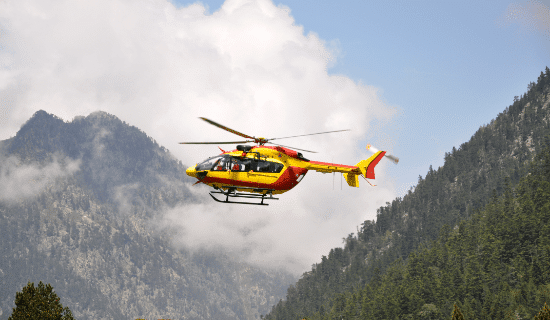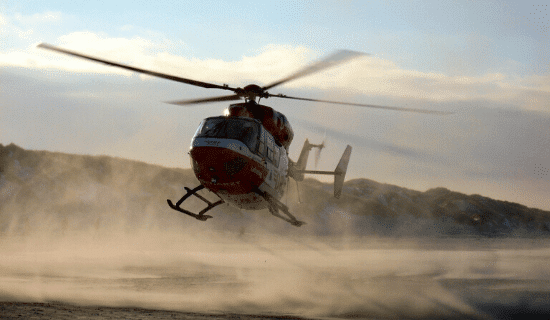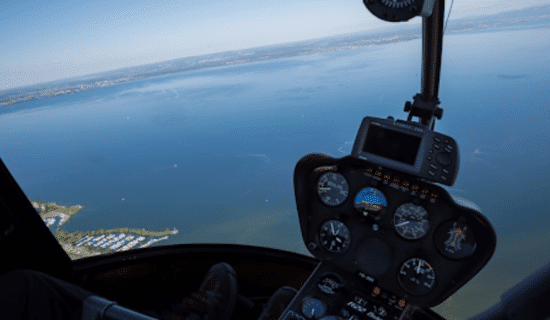Are Helicopters Safer Than Airplanes?
If you’ve ever taken (or considered taking) a helicopter ride, you might be wondering: Are helicopters safer than airplanes? How safe are helicopters, in general? Helicopter vs. airplane safety statistics published by the National Transportation Safety Board (NTSB) paint a complicated picture, especially since helicopters and airplanes are often operated for different reasons and under different conditions.
Many other factors also come into play when you are comparing statistics. Since the Federal Aviation Administration (FAA) does not oversee the safety of tourist helicopter companies, for example, there can be a wide range of training and experience levels among helicopter pilots. Read on to learn more about helicopter vs. airplane safety.
 How Safe Are Helicopters?
How Safe Are Helicopters?
Statistics show that smaller aircraft, including private planes and air taxis (a category that includes helicopters), are more accident-prone than larger commercial flights. According to the NTSB, in 2015, there were zero fatal plane accidents involving commercial airlines in the United States. Of the 415 aviation fatalities in the U.S. that year, 100 percent involved general aviation aircraft, air taxis, commuter planes and foreign or unregistered planes.
Of the three air taxi helicopter accidents in the U.S. which occurred in 2010, two resulted in serious injuries and significant damage to the helicopters. – Review of U.S. Civil Aviation Accidents, 2010
Why is there such a difference in fatal accidents between commercial airlines and smaller aircraft, including helicopters? There are several factors that can help explain this discrepancy. First, in any category of aircraft, the majority of accidents occur during takeoffs and landings. Second, regarding helicopters specifically, the biggest factors affecting flight safety are weather conditions along with pilot training, experience and skill. Since helicopters typically land and take off far more often than larger aircraft, and since general aviation pilots aren’t required to have as much training or experience as commercial pilots, helicopter flights are more prone to accidents, including fatal ones.
 Other Factors Affecting the Risk of Helicopter Flights
Other Factors Affecting the Risk of Helicopter Flights
Unlike airplanes, helicopters do not require a runway for landing, so they are able to land almost anywhere; this is one reason why they are often used in high-risk military or medical rescue missions. Helicopters also fly at much lower altitudes than most other aircraft, which brings hazards like the sudden, unexpected appearance of buildings, landforms or other aircraft into play.
More than half of air tour helicopter accidents between 2007 and 2009 involved system or component failures. – Review of U.S. Civil Aviation Accidents, 2007-2009
Furthermore, since helicopters have far more controls than airplanes for pilots to learn in navigation, the accident rate during training sessions is twice as high for helicopters as for airplanes. The overall rate of helicopter crashes, however, is only slightly higher than that of airplane crashes, and the fatality rate is actually slightly lower for helicopters.
There are also different risk factors among the various types of helicopters themselves. Personal helicopters, which are often operated by less experienced pilots, have a higher crash rate than professionally operated commercial helicopter taxis. Lower-quality helicopters also crash more often than higher-end models, likely due to differences in mechanical quality along with pilot inexperience that leads to aircraft accidents due to human error. Helicopters certainly have more moving parts than airplanes, which means more parts that might fail mechanically, causing an accident.
Most helicopter accidents involved a loss of pilot control, collisions during takeoff or in flight or system failures. – Review of U.S. Civil Aviation Accidents, 2007-2009
Flying in poor weather is another common cause of helicopter crashes. Emergency flights, such as military or medical rescue flights, have a higher crash rate than flights for business or pleasure, since they often fly regardless of weather and other conditions.
 How Safe Are Helicopter Tours?
How Safe Are Helicopter Tours?
Discovering a new area from the unique vantage point of a helicopter is an enticing opportunity. Gaining that aerial view of the terrain below, perhaps to observe or admire animals or landforms you might never have spotted from the ground—it’s no wonder many people love exploring by helicopter. Even helicopter flights close to home are exciting for the new perspective and information they can provide. But how safe are helicopter tours?
Let’s look at the facts and statistics:
- Helicopter tours operated by a more experienced and highly trained pilot are safer than those piloted by someone with less experience and training.
- If you are considering taking a tourist helicopter ride, check the company’s safety ratings and customer reviews before you book your flight.
- It’s also a good idea to keep an eye on weather reports on the days leading up to your flight, so you’ll know if it’s best to cancel or postpone. (Of course, reputable pilots won’t fly in adverse conditions like rain or wind.)
- Finally, helicopter tours are one area in which the old rule of “You get what you pay for” certainly applies.
Companies charging lower rates for a tour are likely making up costs by hiring less-experienced helicopter pilots who require less pay than a more experienced, highly trained pilot. While you can never receive 100% assurance of a safe flight, it may be a good idea to spring for a more expensive helicopter tour with an established company that has high safety ratings and excellent customer reviews.
The Aviation Attorneys At Slack Davis Sanger Can Pursue Your Case
Unfortunately, sometimes accidents happen when you least expect it. If you or someone you know is involved in an aviation accident, whether it’s a commercial flight, air ambulance, helicopter or other aircraft, our attorneys at Slack Davis Sanger have deep experience in aviation law and can advise you on the best course of legal action. Contact us today for a free consultation.

The firm handles cases involving catastrophic personal injuries and deaths. Our work spans three decades of handling airplane and helicopter crashes, truck and car accidents, oilfield and construction accidents, and other devastating accidents. We try lawsuits throughout the country in both federal and state courts and have recovered hundreds of millions of dollars for our clients. To date, we have handled or tried cases in 47 states, read more about our attorneys and firm.
